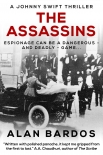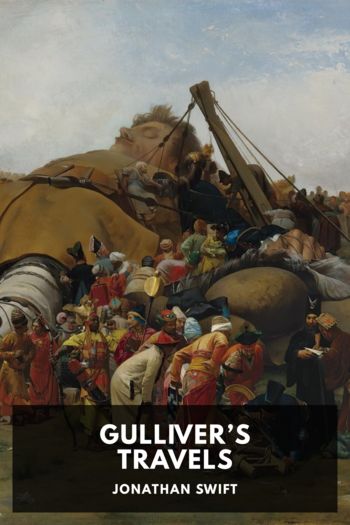The Assassins by Alan Bardos (best novels in english txt) 📗

- Author: Alan Bardos
Book online «The Assassins by Alan Bardos (best novels in english txt) 📗». Author Alan Bardos
Popovic was not happy with this arrangement, 'Can we not choose our own positions?'
'This is where I need you, for one concentrated effort. If there are too many policemen here on the day, then you can go to where you choose,' Ilic added conciliatorily.
'Can I not stand with Vaso? I do not know this person,' Popovic asked, eyeing Johnny guardedly.
'You could always wear glasses,' Johnny suggested.
'How could he afford glasses?' Cubrilovic asked.
'I have never worn glasses. If I started on Vidovdan, it would only raise suspicion,' Popovic said.
'Very well, but you need someone. You can't see fourteen yards across the street, Popovic,' Ilic said, then led them past the Austro-Hungarian Bank on the corner and across the narrow stretch of Cumurija Street, where it led onto the embankment. They stopped in front of the adjacent triangular baroque building at the end of Cumurija Street, which appeared to house a doctor's surgery. Johnny had never looked at the front of it before. The bottom half of the building was made up of striped stonework, with a plain brown facade above it, topped by an ornamental gable and an onion spire.
'Cubrilovic, this is where you will be, next to the first in line, who will be just over there.' Ilic indicated a cafe and the old Turkish houses at the end of Cumurija, in the gap between the triangular building and the other new Neo-Romantic Austrian buildings on the embankment.
'Where exactly?' Johnny asked. He needed to know the precise positions.
'In front of the Mostar.' Ilic pointed to a wooden picket fence around the cafe's garden. Johnny saw Ilic glance quickly into the garden before turning back to the group.
'Cubrilovic, you are to act as soon as you see the first in line throw his bomb.'
'Who is this first in line?' Cubrilovic asked.
'The most experienced man,' Ilic said. 'He will know when to act.'
Johnny wondered how they were going to coordinate their actions if they didn't know each other. He didn't like to ask, as he hadn't been on the friendliest terms with Ilic since he had accused him of being a traitor.
From what Ilic had said, Johnny supposed Gavrilo and his cell would be further up Appel Quay near the other bridges, but there was no way for him to know for sure. Breitner had said that the priority was to find out who all of the members of this cell were, so Johnny decided to put all his effort into finding this other man. If he was as experienced as Ilic said, he would likely be the most dangerous.
*
Breitner snapped open his pocket watch for the umpteenth time. It was nearly five and Johnny still hadn't arrived. He stood up and began to move impatiently about the waiting room, prompting the officer of the guard, who was busy writing lists of lists, to make a huffing noise. Breitner ignored him - it was because of bureaucratic fools like him that he was in this situation.
Breitner had expected the Archduke's visit to be cancelled. There had been numerous warnings about the threat posed by nationalist organisations to the Archduke, should he come to Bosnia, which had been issued to both Governor Potiorek and Vienna. Consequently, Breitner hadn't been overly concerned about Johnny's apparent lack of progress infiltrating the Young Bosnia cell over the past few weeks. It took time to establish oneself with people like that and he wasn't convinced that Johnny was up to the task. He'd been pleasantly surprised not to have read about the murder of some nameless youth in his morning reports. However, when it became blatantly clear that the visit wasn't going to be cancelled, what had started out as an experiment to try and flush out a group of possible assassins had become the last line of defence, and all that stood between his world and catastrophe.
The Hofburg elite didn't seem to care whether or not Franz Ferdinand was killed in Sarajevo; he was universally disliked and considered to be something of an ogre. They probably believed that cancelling the Heir's visit would only have provoked his anger - a view Breitner could sympathise with.
Breitner had heard through his old colleagues in the Intelligence Bureau that the warnings from the police, consular officials in Serbia and military intelligence which had been pouring into the Interior, Foreign and Military Ministries in Vienna had been ignored or lost in the massive bureaucratic muddle of the Austro-Hungarian Monarchy.
There was a general distaste for information gathered through intelligence sources, not least because Austrian agents had inadvertently provided forged documents that had become the basis for two recent high profile trials. Breitner believed that the forgeries had been produced by Serbian Intelligence and passed on through a double agent, as part of an operation to stir up trouble and embarrass the Austro-Hungarian Government. The ensuing scandal undoubtedly caused Vienna to cripple intelligence gathering activities in the Balkans.
The considered view of the Foreign Ministry was that the Serbian Government and its army were more concerned with fighting each other, than staging an operation against the Heir, regardless of what any extremist splinter groups might attempt. The Foreign Ministry had even asked for the colour coded ribbons that were put around the warnings to be changed from red to the standard yellow and black. The Ministry of the Interior argued that Bosnia was not within their area of responsibility. His own superior at the Joint Ministry of Finance, Count Bilinski, whose responsibility it certainly fell under, had washed his hands of the visit as a purely military matter.
At the local level, Count Carlo Gallas, the Chief of the Bosnian Government's Political Department, had told General Potiorek of the growing





Comments (0)